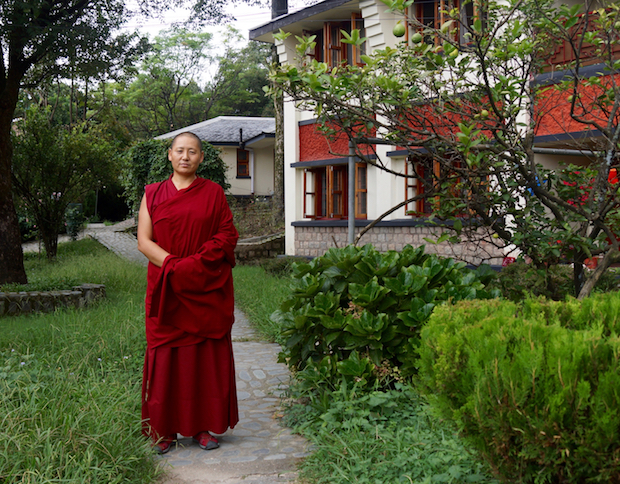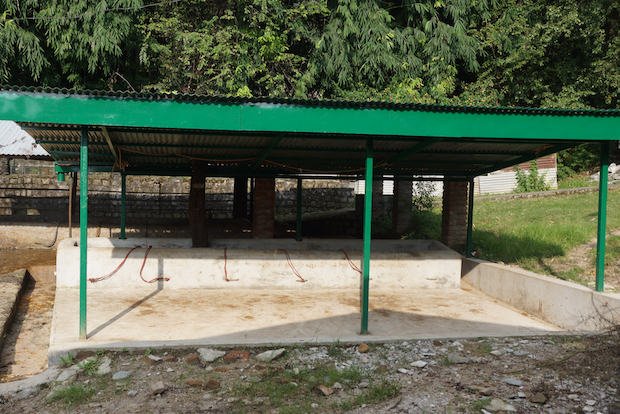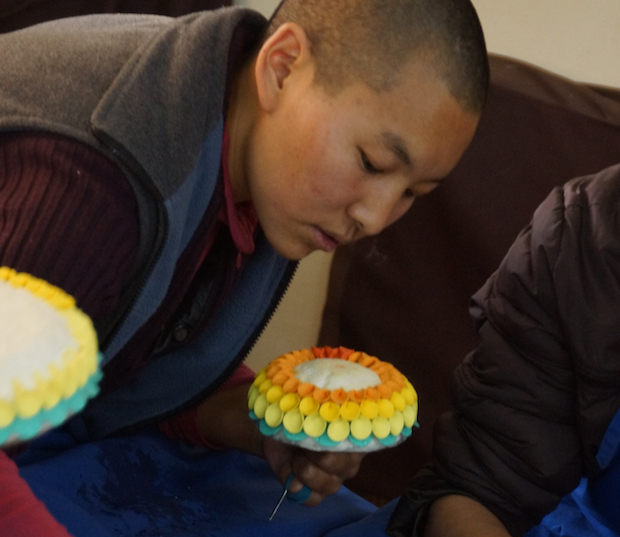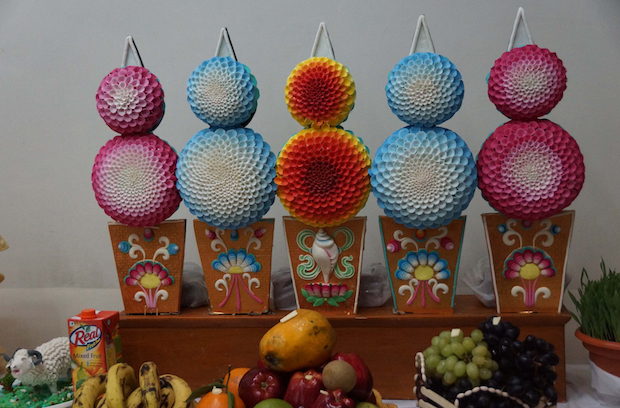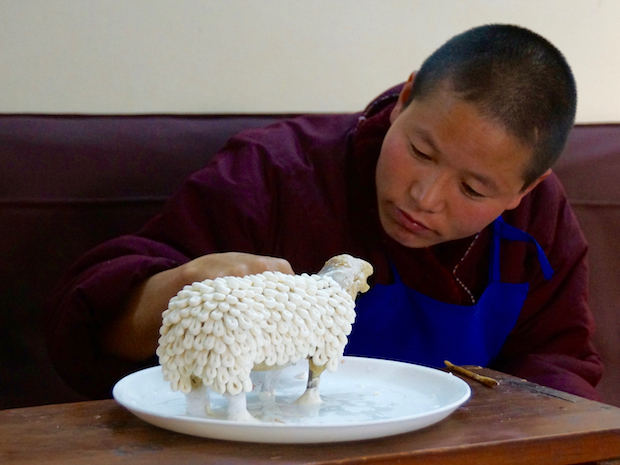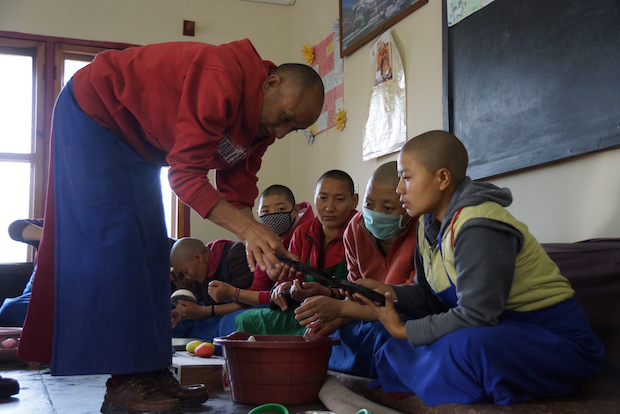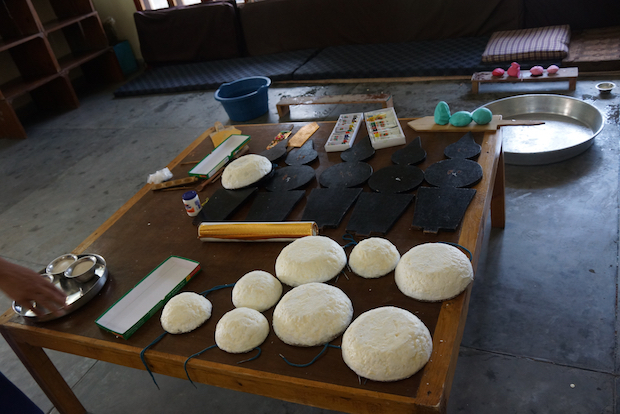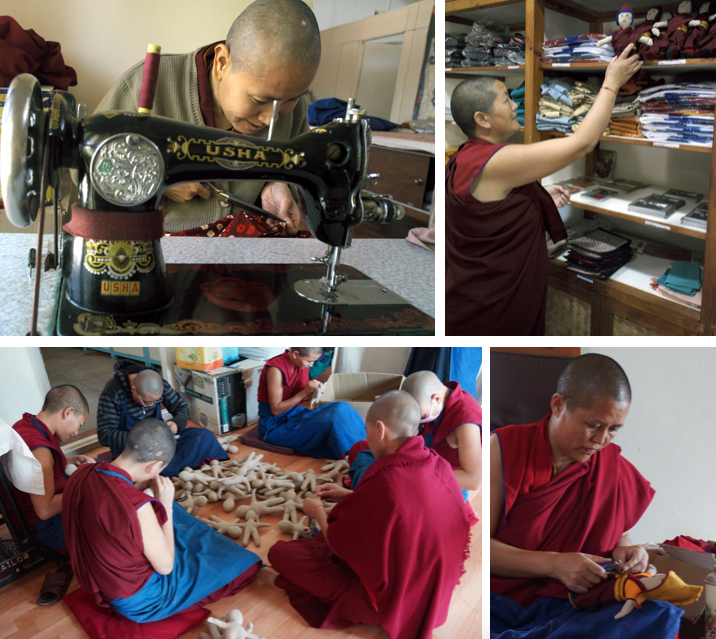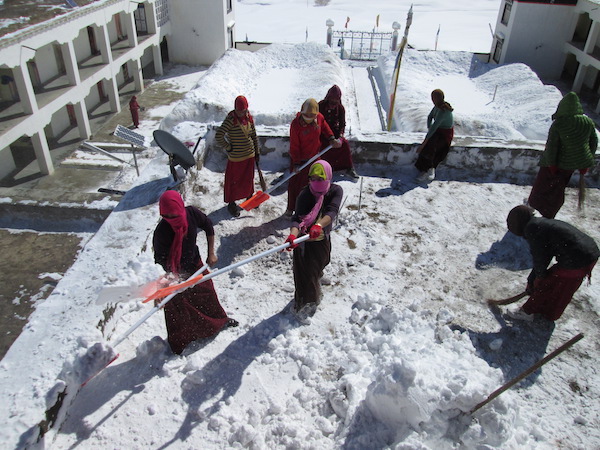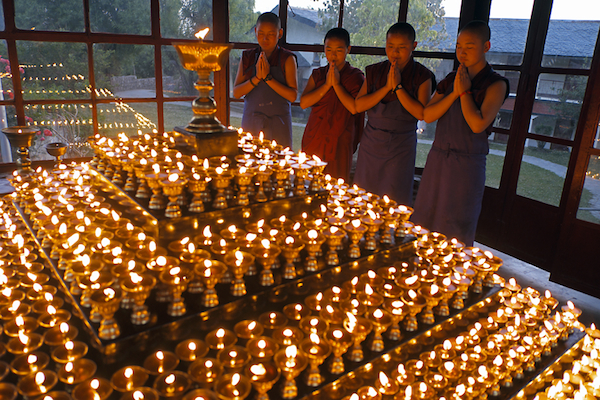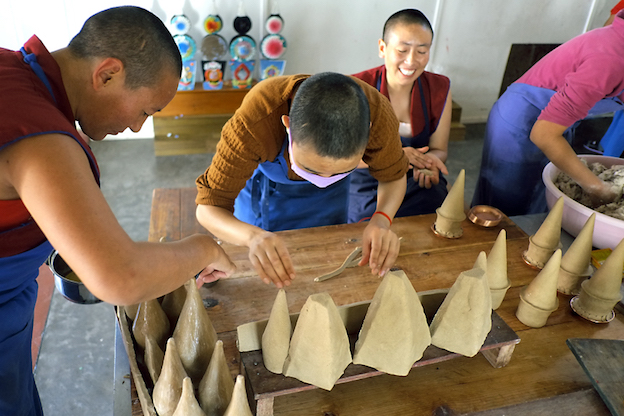Every so often we receive messages about how to hang and dispose of Tibetan prayer flags respectfully.
Tibetan prayer flags are used to promote peace, compassion, strength, and wisdom. Tibetans believe the prayers and mantras will be spread by the wind and bring goodwill and compassion to benefit all beings.
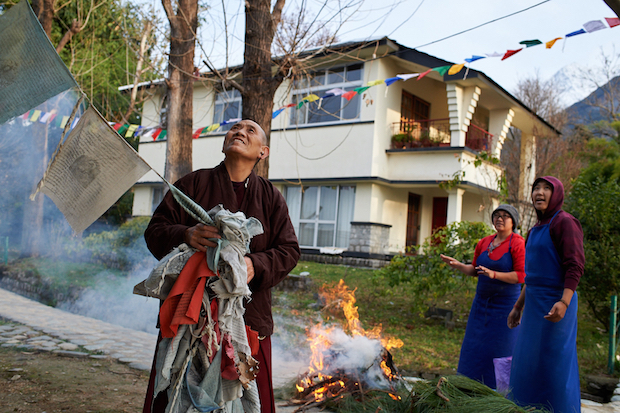
Tibetan nuns at Dolma Ling Nunnery in India remove and burn old prayer flags and set up new ones to mark Losar, Tibetan New Year. Photo courtesy of Olivier Adam
Prayer flags are made of block-printed fabric using traditional printing techniques going back hundreds of years. The Tibetan Buddhist nuns at Dolma Ling Nunnery in India have been making prayer flags for many years. We sell these specially blessed objects through our online store and the revenue helps provide food, health care, shelter, and education for the over 230 nuns who live at the nunnery, as well as to help support around 500 nuns at six other nunneries in India.
Some people have asked whether it is appropriate for non-Buddhists to display Tibetan prayer flags. Yes, it is fine for non-Buddhists to display Tibetan prayer flags.
When raising prayer flags it is important to have a good motivation. One should not have selfish or limiting thoughts. When hanging prayer flags one should wish that all beings everywhere will benefit and find happiness.
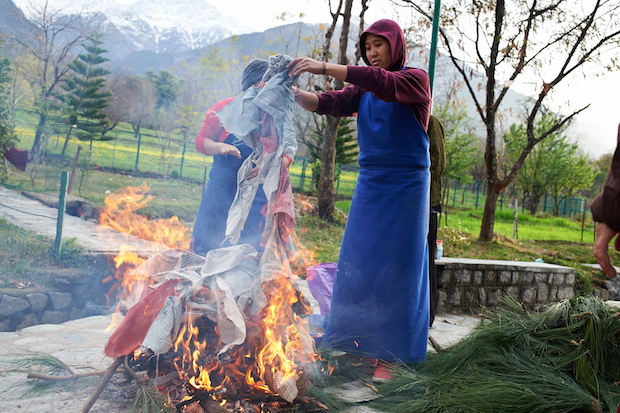
Being careful not to let the old prayer flags touch the ground, a Tibetan Buddhist nun burns the flags while wishing to end the suffering of all sentient beings. Photo courtesy of Olivier Adam
Tibetan tradition considers prayer flags to be holy. The flags contain sacred texts and symbols and should be treated respectfully. They should not be placed on the ground or put in the trash.
When disposing of old prayer flags one should burn them so that the smoke may carry their blessings to the heavens. Do not let prayer flags touch the ground as they are burned.
As you are burning the prayer flags, you should try to remember the intentions with which the prayer flags were made and blessed and have compassion for all sentient beings.
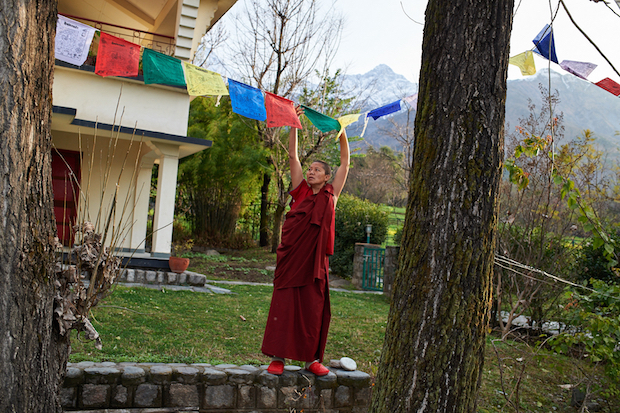
A Tibetan Buddhist nun at Dolma Ling Nunnery hangs new prayer flags at Losar, Tibetan New Year. Traditionally, prayer flags are hung outside so the wind can carry the prayers to the world for the benefit of all sentient beings. Photo courtesy of Olivier Adam.
You may also choose to let your old Tibetan prayer flags fade and disintegrate naturally, hanging new prayer flags up with old ones. The contrast between old and new prayer flags is a reminder of impermanence and the continuing cycle of birth and death.
The traditional cotton prayer flags, like those made by the nuns at Dolma Ling and sold in our online store, fade more quickly than synthetic ones and may be safely burned. The fact that they do not last is part of their nature and is a reminder of the central Buddhist teaching of impermanence.
Traditionally, Tibetan prayer flags come in sets of five, with one flag in each of five colors, left to right in this specific order: blue, white, red, green, and yellow. The five colors represent the elements: blue symbolizes the sky and space, white symbolizes the air and wind, red symbolizes fire, green symbolizes water, and yellow symbolizes earth.
Another question that we’ve received about Tibetan prayer flag protocol is whether it is OK to disassemble them and use them separately, or do they have to be displayed together in a row so that all the elements are represented. We would suggest that it is better not to take apart the set of prayer flags. They are meant to represent the five elements in balance and it is not really appropriate to the purpose or culture to separate them.
You can buy Tibetan prayer flags through the Tibetan Nuns Project online store. They come in a variety of types and sizes of prayer flags as follows:
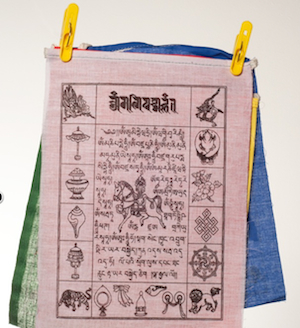 Windhorse Prayer Flags
Windhorse Prayer Flags
The Wind Horse or Lung-ta is the most prevalent symbol used on prayer flags. In the center of the prayer flag is a powerful horse (lung-ta) bearing three flaming jewels on its back. These jewels represent the Buddha, the Dharma (Buddhist teachings), and the Sangha (Buddhist community) which are the three cornerstones of Tibetan philosophical tradition. The horse (Ta) is a symbol of speed and the transformation of bad fortune to good fortune. Surrounding the Lung ta are mantras and Buddhist sacred symbols. In the corners of the prayer flags are images of four powerful animals, also known as the Four Dignities: the dragon, the garuda, the tiger, and the snow lion. Windhorse prayer flags made by the nuns are available in three sizes. Buy Windhorse Prayer flags here.
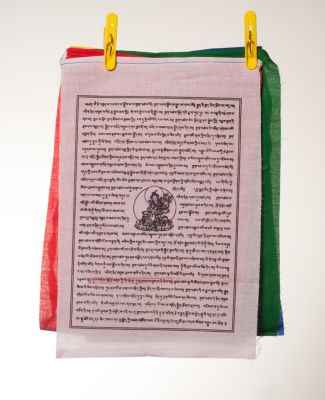 Tara Prayer Flags
Tara Prayer Flags
Tara represents virtuous and enlightened action. It is said that her compassion for living beings is stronger than a mother’s love for her children. She also brings about longevity, protects earthly travel, and guards her followers on their spiritual journey to enlightenment. The Tara prayer flags have a lovely image of Tara in the center. You can order Tara prayer flags in three sizes here.
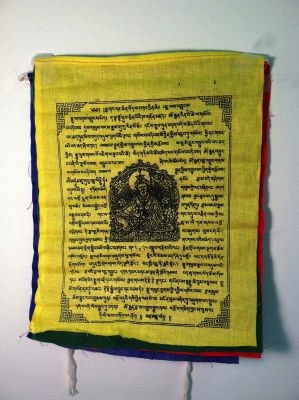 Guru Rinpoche Prayer Flags
Guru Rinpoche Prayer Flags
Padmasambhava, the renowned saint of the eighth century, was a central figure in shaping Buddhism’s history in Tibet. Revered as the second Buddha, Guru Rinpoche (Precious Guru) conquered the local deities and demons of Tibet and bound them by oath to become guardians of Buddhism. Purchase Guru Rinpoche prayer flags in three sizes here.
 Gyaltsen Tsenpo Prayer Flags
Gyaltsen Tsenpo Prayer Flags
This is a common prayer flag, especially at New Year, symbolizing new ventures and beginnings. Gyaltsen Tsenpo prayer flags are printed with sutras bestowed by Lord Buddha to Indra, king of the gods to overcome his enemies and achieve victory. Order Gyaltsen Tsenpo prayer flags in three sizes here.


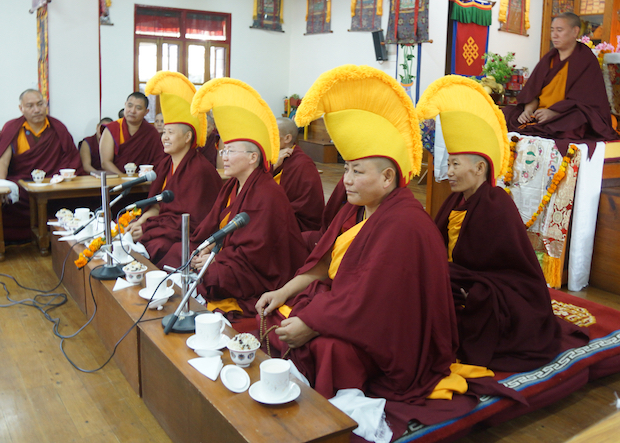
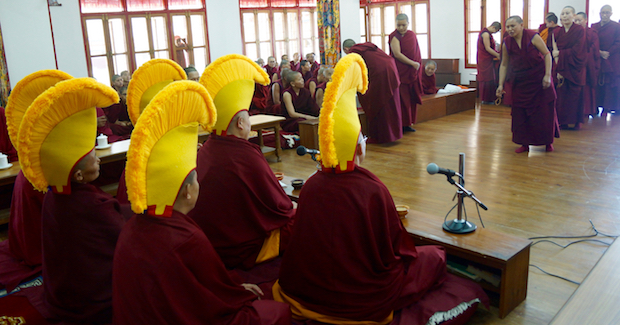
 Dolma Ling
Dolma Ling ONLY $167 NEEDED TO COMPLETE THE PROJECT
ONLY $167 NEEDED TO COMPLETE THE PROJECT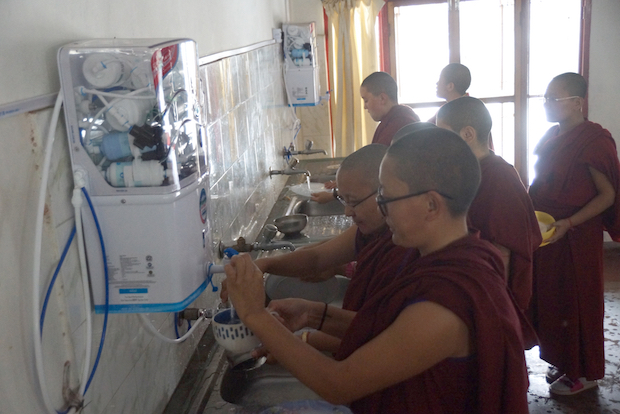 PROJECT FULLY FUNDED – THANK YOU!
PROJECT FULLY FUNDED – THANK YOU! $7,150 NEED TO COMPLETE THE PROJECT
$7,150 NEED TO COMPLETE THE PROJECT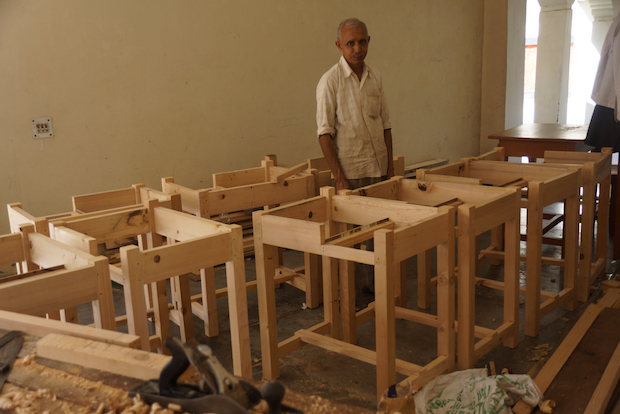 PROJECT FULLY FUNDED – THANK YOU!
PROJECT FULLY FUNDED – THANK YOU!